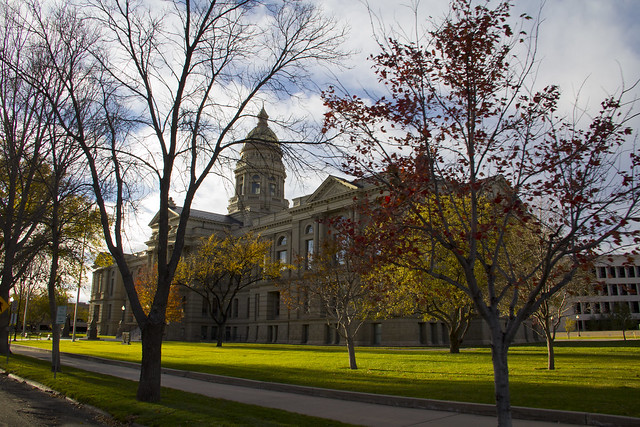
The 2020 legislative session in Wyoming will have a long list of new and higher taxes to consider. The Joint Revenue Committee, under the leadership of Senator Cale Case and Representative Dan Zwonitzer, is more determined than ever to pass everything from higher property taxes to a corporate income tax.
The 7-percent corporate income tax has already made it out of committee – and businesses in Wyoming are already paying attention.
It is well known that tax hikes are never good for the economy, but even the talk about higher taxes can have negative consequences for the economy. Wyoming is now seeing, in real time, how this psychology goes to work: a steady trend of jobs growth over the past couple of years is coming to an end.
In 2015 the the Cowboy State’s economy went into a short but tough downturn. Over two years it lost 17,000 private-sector jobs (while government payrolls kept steady). Since the bottom of that downturn, the private sector has slowly crawled itself back to growth again. By January 2018 hard-working businesses had recovered almost 22 percent of the jobs lost since 2015.
In January this year half the jobs lost were back. With a little bit of luck and a lot of hard work, the private sector could recover all the lost employment. In fact, for the first seven months of this year Wyoming businesses kept adding jobs: on average they had 2.2 percent more employees than the same month a year before. A slow but steady recovery.
Then, in August, the Revenue Committee passed its corporate income tax:
Source of raw data: Bureau of Labor Statistics
Many factors influence business decisions to hire and fire people, but the tax burden is definitely one of them. It is only common sense that when a state says it wants to go from zero to a 7-percent corporate income tax, those expected to pay the tax will pay attention – and respond accordingly.
For now, the tax is “limited” to corporations with at least 100 shareholders, though that cap is likely to vanish soon after the tax goes into effect. It was put in the bill to soften opposition and give the impression that a new tax is not really a new tax. The big step for now is to just get the tax in place; once it is up and running, the legislature can easily “tweak” it as they see fit.
And prospective taxpayers are paying attention. Here are more September jobs numbers for Wyoming, courtesy of the Bureau of Labor Statistics:
- The minerals industry has ended a three-year stretch of jobs growth;
- In retail, general merchandise stores – supermarkets – continued a jobs-cutting streak that began in June (when the Revenue Committee made clear they were going for the corporate income tax);
- Business-to-business employers also continued a jobs-cutting trend from the summer.
There are also emerging signs of pull-back in parts of the leisure and hospitality industry.
It is important to keep in mind that the corporate income tax is far from the only tax on its way in Wyoming. The increase in the state property tax would add nine millings, there are proposals for and expanded sales tax and higher local sales taxes.
As anyone watching Wyoming politics over the past few years can testify to, the Revenue Committee is more determined than ever to raise taxes. This also means that once they get the corporate income tax in place, they will continue to work with it in order to maximize revenue.
And this is only the beginning. Once the corporate tax is in place, it will be a simple matter for the legislature to expand it. Today, Wyoming law grants a deduction for property and sales taxes against any income taxes paid. This deduction will last about as long as the 100-shareholder threshold for the corporate income tax, namely to the next legislative session.
Bluntly: once the Wyoming legislature passes the corporate income tax, its burden will only grow from there. The 2020 session will be more important than ever for Wyoming taxpayers.
Sven R Larson, Ph.D., is a political economist residing in Wyoming.

